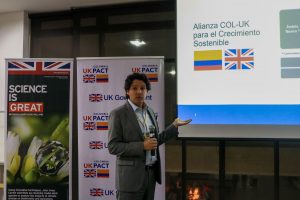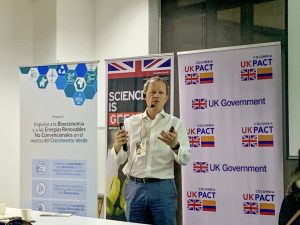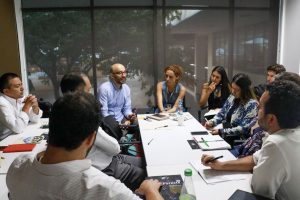
On October 17, 2019 in Cali, Colombia, the workshop: “Building the National Bioeconomy Strategy” was hosted by GGGI together with the National Planning Department – DNP and the Embassy of the United Kingdom, following the UKPACT project “Support in the implementation of Colombia’s Green Growth Policy through investments and capacity development of public and private actors”. The workshop was part of the agenda Bioexpo 2019, the most important green and sustainable business fair in the country.
The event was attended by more than 50 representatives from entities such as: the Presidency of the Colombian Republic, the Ministry of Environment, Humboldt Institute, National Administrative Department of Statistics – DANE, The Administrative Department of Science, Technology and Innovation –Colciencias, Partnerships for Forests, Colombian Agricultural Research Corporation – AGROSAVIA, National Association of Businessmen of Colombia – ANDI, Fondo Acción, Natura, Universidad Icesi, Universidad del Valle, Regional Environmental Authorities, among others. Presentations were given by GGGI, the DNP, the UK Embassy, the Ministry of Environment and Partnerships for Forests.
Dr. Lionel Clarke, Co-Chair of the Synthetic Biology Leadership Council of the United Kingdom, was invited as the international guest and expert. Dr. Clarke presented the lessons learned on the UK Bioeconomy Strategy as well as expert recommendations to develop the National Bioeconomy Strategy in Colombia, such as: 
- Assisting the development of governmental policy with by providing independent advice.
- Using public funding (seed funding) to support start-up businesses, which will knock-on to attracting potentially much greater private funding.
- Seek to apply innovative technology which is essential to implement transformative solutions.
- International cooperation is vital– much relevant wisdom on global issues is found and being made in other parts of the world.
- Whether a financial value could be allocated to biodiversity similar to how carbon trading gives value to GHG mitigation.
- Being guided by the longer-term trajectory: envisioning the future through others (trends, learnings)
- Governance must be effective, but avoid over-regulation, which can inhibit the innovations necessary to respond to local and global challenges.
The workshop ended with a discussion and feedback session split into working tables by subsectors of bioeconomy such as: Health and pharmaceutical, agricultural bio-supplies, natural ingredients and non-timber forest products. The participants identified the opportunities and barriers for each subsector, which served as valuable contributions to be considered for the construction of the National Bioeconomy Strategy. 